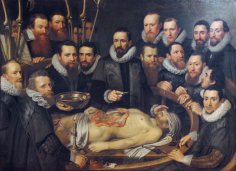
Every well-mannered person strives to make their speech richer, brighter, more interesting. After all, whether you will be hired or get a raise depends largely on the words you speak. The first impression is formed by clothes, and the second? Of course, by intelligence.
So people weave bright, interesting, memorable expressions into their speech, it's just a pity that not everyone knows what these phrases meant before. Where did this or that phraseological unit come from?
Here, for example, is “to lead by the nose” . To deceive, to promise and not to fulfill. And this expression comes from Central Asia. There, on the roads, you will see a strange picture. A tiny boy or girl is walking and leading a huge camel. The animal is walking obediently, because the child is pulling it by a rope tied to a ring threaded through its nostrils. Try not to obey! And whether you want to, you will follow if you are led by the nose.
The expression “to rub the glasses” came to us from card sharpers and has nothing to do with optical devices. Glasses are red and black signs on cards. Card sharpers often “rubbed the glasses” – pasting an extra sign on the card, changing its value.
“Keep your pocket wider” has changed little in its meaning over three hundred years. However, did you know that the word “pocket” in the 18th-19th centuries meant a bag or sack attached to clothing from the outside. Such pockets could be attached to a horse's saddle, they could be carried and passed around. If it was necessary to pour something in a considerable amount, the sack had to be untied and “held wider”.
The phraseological unit “after the rain on Thursday” has pagan roots. Who would have thought! The most ancient ancestors of the Russians revered the main god among their gods above all else – the god of thunder and lightning Perun. Of the days of the week, Thursday was dedicated to him. Prayers were offered to Perun for rain during drought; it was believed that he should be especially willing to fulfill requests on “his day”. And since these prayers often remained in vain, the saying “After the rain on Thursday” began to be applied to everything unrealizable, which is unknown when it will come true.
The term “bluestocking” used to refer to a man, not a woman. In England in the second half of the 18th century, it denoted a circle of people of both sexes who gathered to discuss literature. The life and soul of these gatherings was the scholar Benjamin Stellingfleet, who, ignoring fashion, wore bluestockings. When he was not there, the others often repeated: the conversation did not go well today – no bluestockings. Gradually, the epithet stuck to all members of the group, and then only to women, already with the negative connotation with which it entered history and has reached our days.
The expression “Alpha and Omega” has its roots in the biblical Apocalypse. The line from the Mary Poppins song echoes the Holy Scripture: “Everything in life comes full circle.” Compare with Ecclesiastes – 1:6. This is the kind of plagiarism that results.
Another phrase from the Bible: “a wolf in sheep's clothing” . The expression originated from the Gospel: “Beware of false prophets, which come to you in sheep's clothing, but inwardly they are ravenous wolves” (Matthew, 7, 15). The expression is used as a characteristic of a hypocrite who hides his evil intentions under the mask of virtue.
Some “winged expressions” came to us relatively recently. When we say “the legend is fresh, but hard to believe”, “evil tongues are more terrible than a gun”, “happy people do not watch the clock” , we echo the heroes of Griboyedov's comedy “Woe from Wit”.
So, everything is not as simple as it seems at first glance. Study Russian – and you will definitely not be at a loss for words.





